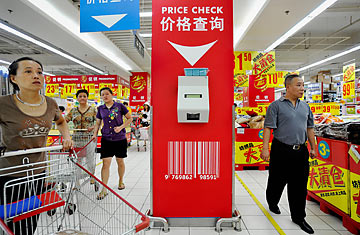
Customers shop at a supermarket in Shanghai.
(2 of 2)
Yet economists say Beijing's measures aren't going far enough. Huang Yasheng, professor of political economy at the MIT Sloan School of Management, says that the government needs to do much more to accelerate the income growth of poor Chinese if consumer spending is to play a bigger role in the economy. The average Chinese, he says, doesn't have as much cash to spend as many people think. Actual household income per capita is only about half of GDP per capita, compared to 80% or more in other major economies, placing "a cap," Huang says, on consumer spending. The problem is that income growth among rural dwellers and migrant workers badly trails that of residents of the major urban centers creating a mass of 900 million people who still tend to be very heavy savers. Huang suggests that China needs to act aggressively to boost rural incomes, by, for example, extending banking systems deeper into the countryside to give farmers better access to credit to start small businesses. MasterCard's Hedrick-Wong argues that China should also open up service industries now dominated by large, state-owned companies, such as finance, to allow new entrepreneurs to flourish, creating more jobs with higher wages.
Such efforts will take years to bear fruit, however time the global economy may not be able to afford. Economists agree that China and the United States must alleviate the imbalances that contributed to the current crisis if the world economy is to find renewed, and healthier, growth. China saves too much and spends too little, leading to giant surpluses and hard currency reserves, while the U.S. saves too little and spends too much, creating giant deficits and debt. Unless China can transform its citizens from savers to spenders, the reform of the entire world economic system could suffer. "I don't see any evidence" that China's economy is rebalancing, MIT's Huang says. "Its always difficult to get consumption to grow in a limited period of time." Greater consumer spending in China could have a big impact as well on the world economy. Cornell's Prasad figures that if China can increase growth of private consumption to 20% a year (much higher than the trend of nominal GDP growth of about 15%), global GDP growth would get a meaningful 0.25% boost.
With so much on the line, the subject of "rebalancing" will likely get top billing during U.S. President Barack Obama's November visit to China. President Hu Jintao and the rest of China's top leaders clearly agree with Washington that the country's consumers need to spend more. Pressure from Obama to speed that process along by, for example, continued improvements in China's social safety net, might be met with nods of approval. But Obama will only be able to press Beijing so hard. China's policymakers are still wedded to supporting the country's valuable export industries. Any suggestions from Obama that would result in a drastic shift of the economy away from exports and towards heavier reliance on domestic spending will be less welcome. The most sensitive of these issues may be China's currency regime. Obama will probably try to cajole Beijing into allowing the yuan to appreciate, thus making Chinese exports less competitive. But economists doubt China's leaders will take drastic steps to reform its currency system anytime soon.
But perhaps there is reason for optimism, thanks to Xi'an residents like Lu Bo, shopping one recent evening for a new fridge at a Suning appliance store. The 32-year-old, who works as an salesman in the air-freight department at China Eastern Airlines, says his salary was reduced by a third last year when his company was hit hard by the financial crisis, but that hasn't stopped him from spending. With China's future so bright, he doesn't worry too much about saving for the future. "Judging from my job, my life, I think everything will become better and better," Lu says. And maybe for the entire world economy as well.
With reporting by Chengcheng Jiang / Xi'an
